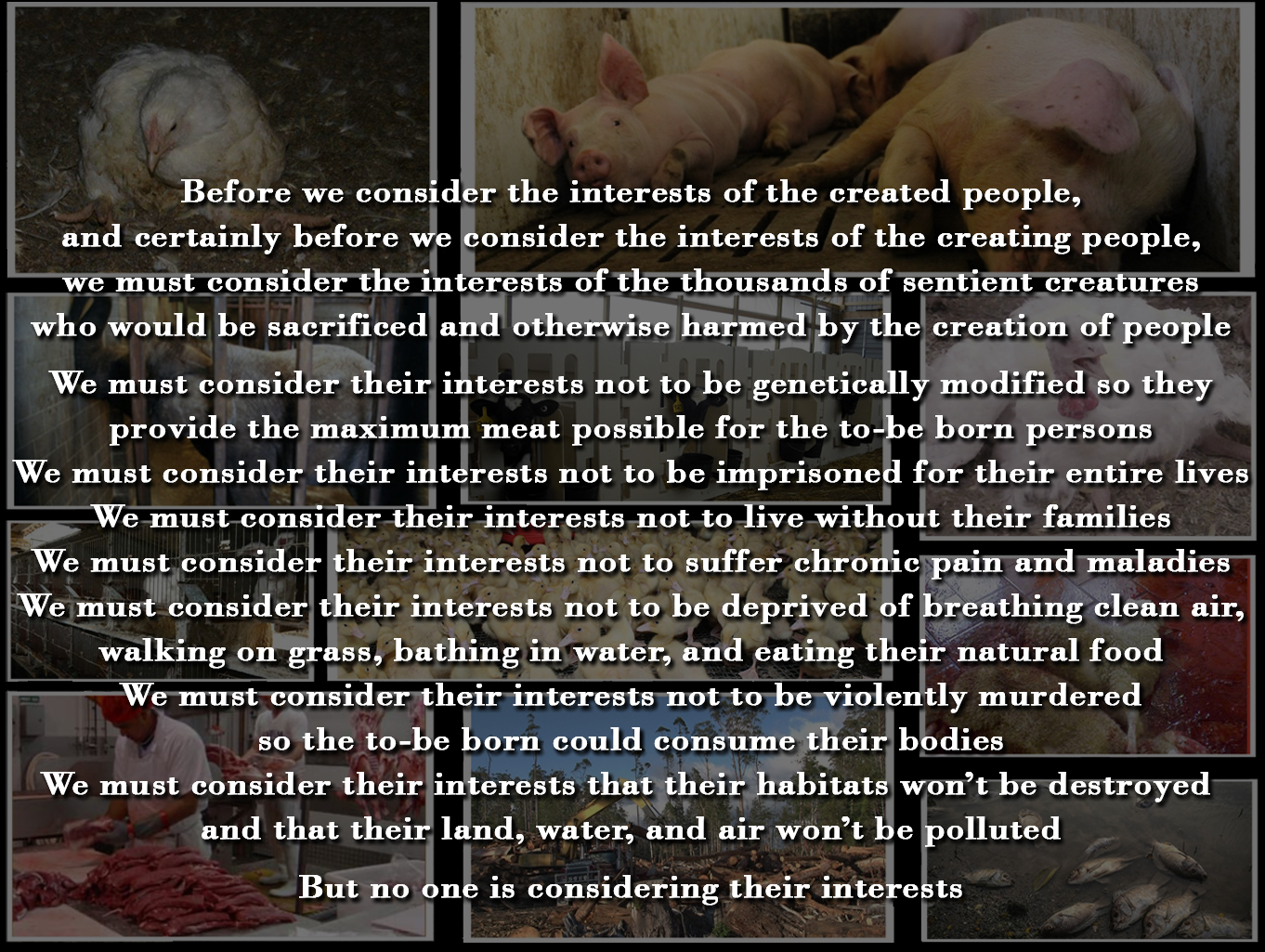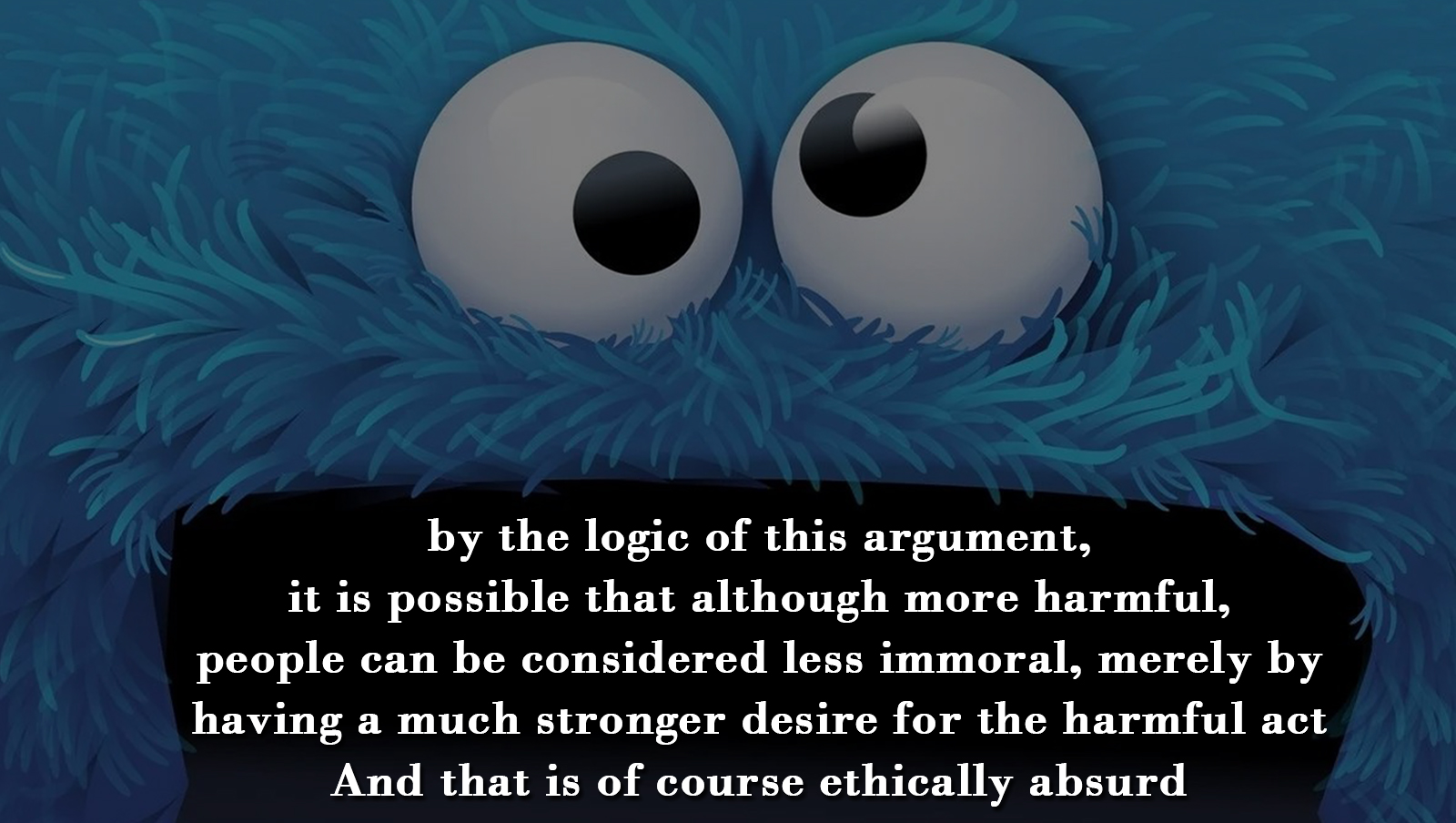f

A very common pro-natalist claim is that the pleasures of the created person are expected to be greater than the harms and therefore it’s in the interests of a person to be created.
There are several ways to counter this claim, such as that life is never as good as one thinks it is (Benatar’s quality of life argument) and that no matter how good one’s life supposedly is, it is always better for that person never to have been (Benatar’s asymmetry argument), or arguing that the claimed statement is even technically impossible since pleasures are not really intrinsically good but are actually tension release of cravings which always precede them and so by definition they can’t be greater than harms (which are also more important), or arguing that even if it was possible that the pleasures would be greater than the harms, procreation would still be unethical since there is no guarantee that that would always be the case, or that it is still unethical since causing someone harm without prior consent is wrong even if pleasures were intrinsically good and even if it could be guaranteed that they would be greater than harms, or that even if pleasures were intrinsically good and even if it could be guaranteed that they would be greater than harms, and even if consent could have been obtained beforehand, then in that hypothetical scenario the pleasures might have outweighed the pains of the created person, but that would certainly not be the case for every other person who would be affected by that creation. In other words, due to the harm to others, all the more so since it is so extensive, even if it was possible that for the created person the pleasures would outweigh the harms, it can never be the case for most of the ones who would be harmed by that person, and therefore its creation can’t be morally justified.
For all these reasons independently, let alone collectively, procreation is harmful and immoral.
However, in this text I wish to focus on the less common yet quite frequent pro-natalist claim regarding, not the supposed interests of the to be created person, but those of the to be creating people, or in other words, the claim that we need to consider the interests of the people who want to procreate and would be harmed if they don’t (a harm which according to pro-natalists’ false assumptions regarding the general harms of procreation, might be greater than that of the created person).
This claim is often related to the first one as even most of the more adherent pro-natalists don’t think that cases of miserable lives are justified by the interests and desire of the parents. However, merely by placing these interests together, these pro-natalists are claiming that harming others should be weighed against the harmful interests of the harmers, and that the harm can be justified if the harmers’ desire is strong enough. In other words, the interest of the harmer needs to be considered against the interest of the harmed, and so, peculiarly, the stronger the desire to create the platform for harms, the greater the chances of the harms to be justified, since according to the logic of this claim, the stronger the desire the stronger the harm caused by withholding it.
Due to the fact that procreation is extremely harmful and morally wrong for the reasons specified earlier in this text, it is unethical, if not absurd, to consider the interests in doing something which is basically wrong, as a counter argument for the action’s wrongness. It is balancing the harmfulness of a crime with the interests of the criminals to perform it. A strong interest to do something wrong doesn’t make it right. Neither does the resulted frustration if the wrong action is prohibited. To claim otherwise is to nullify criminalness, as all that offenders should claim is that by stopping them from committing a crime we are violating their interests. The interests of every offender are violated if they can’t continue with their offences, is it a justified reason to let them go on with their crimes? If the interest of a person to rape is really strong, should we somehow balance the interest of that person to rape a girl with her interest not to be so extremely harmed by that person?
According to the logic of this claim, if a person wants to create someone more than that someone would want to avoid the harms caused to it as a result of its creation, then the harms are justified. That turns the interests of the person with the ethically wrong desire, to be as morally important as the interests of the ones who would be harmed as a consequence of carrying out that ethically wrong desire. That is ethically wrong and distorted since the situation is forced on that person without consent, and since there is no way for anyone to guarantee that it would be the case that the desire of the parent to create a new person would be stronger than the desire of the created person not to be harmed by being created, and since this claim permits harming others as long as the selfish and harmful interest of the creating person seemingly overpowers the interests of every victim involved (which as earlier mentioned, practically can never be the case and is addressed here as such only for the sake of the argument).
Even if, for the sake of the argument, we’ll accept the logic of its premises, the harm of procreation is way too grievous and enormous to ever be seriously considered against the interest of the desiring procreators. Procreation is not only forcing needless and pointless suffering on the created person, but is also, and in fact first and foremost, forcing needless and pointless suffering on thousands of other sentient creatures, since each person created is hurting thousands of sentient creatures during a lifetime.
People are harming others on a daily basis, mostly to feed themselves but also to cover themselves, to move from place to place, to heat their houses, to build their houses, to communicate with each other, to entertain themselves, and practically through most of the things they consume.
Once the interests of everyone involved in procreation are considered, and once a true consideration of the extent of harm caused to each individual by procreation is taken, given that it is probably thousands of sentient creatures who are sacrificed for each created person, with many of them being tortured in factory farms, then suggesting to nevertheless consider people’s desire to procreate is a monstrous argument.
Speaking of monsters, the argument that the more someone wants something, even that something being extremely harmful to others, the more the interests of that person to fulfil that harmful desire should be considered, and the more likely it is to be balanced with, or at least reduce the deficit of, the harms caused by fulfilling that desire, can be viewed as a very loose version of Nozick’s notion of utility monsters, in this case a desire based one. That is in a sense that for that claim to work, at least hypothetically speaking, it needs “desire monsters”, meaning people whom their desires are so strong that they defeat many others’ interests. (originally, Nozick‘s utility monster is a thought experiment designed to criticize Utilitarianism by presenting the hypothetical option of an entity that gains so much greater pleasure than others, that following classical utilitarian principles, everyone must sacrifice their pleasures for the sake of the utility monster in order to achieve the greatest utility possible, however, the aim of my very loose paraphrase of it here specifically, is not to join the criticism or to defend Utilitarianism, but merely to function as an illustration of the fictitious level of intensity the desire to procreate must reach for it to be considered against the harms to others). In other words, to morally consider people’s desire to procreate despite the enormous harm forced on others, these people must be “desire monsters” – the more they desire something the more they would get hurt by not getting it.
But obviously the claim, that the harm to the people who want to procreate but don’t can be greater than the harms caused by procreation, is wrong ethically and it is implausible even hypothetically. That is because the desire to do something harmful (and the initial desire in this case is harmful and morally wrong), mustn’t be weighed against the desire not to be harmed, and because obviously “desire monsters” – people whose desires to procreate are so strong that preventing it from them would be more harmful for them than the harms caused to the person they would create and the harms caused by the person they would create and the harms caused by the person they would create – can’t really exist.
It is even questionable whether the “harm” of preventing someone’s harmful desire from being fulfilled can even be seriously considered a harm, so it most certainly can’t be seriously considered against the harms caused by that harmful desire.
But it goes even further than that. What should be weighed against the interests of people who want to procreate is not only the people who would be born into miserable lives, and not only the sentient creatures who would be harmed by the newborns of the current people who want to procreate, but all the harms, and all the misery, and all the suffering that would ever be caused by humans. The equation is between one generation of people who would sacrifice their desire to procreate, and all the victims of all the procreations that would ever occur.
Human procreation is not only risking the created persons who might be sacrificed for the sake of people’s desire to procreate, it is ensuring that numerous generations of sentient creatures would be sacrificed for one desire of one generation, of one species only.
And since people don’t even take seriously the possibility that their own children might suffer extremely, there is no chance they would ever take seriously the certainty that numerous generations of sentient creatures would suffer extremely because of their procreation. That’s why we mustn’t wait until people understand that it is ethically impossible to justify procreation, but do everything we can to make it impossible to procreate.



Leave a Reply